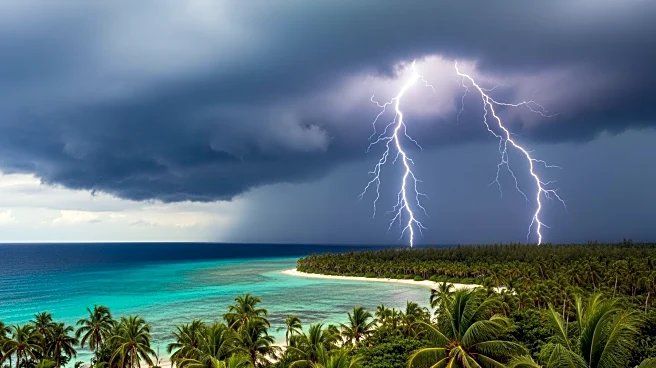What's Happening?
Jamaica has been severely impacted by Hurricane Melissa, one of the most powerful Atlantic storms on record. The hurricane, with wind speeds reaching 185 mph and a barometric pressure of 892 millibars, tied records for the strongest Atlantic hurricane at
landfall. The storm caused catastrophic flooding, particularly in the western part of the island, leading to significant casualties and destruction. Many municipal buildings and hospitals, located near the coastline, were directly affected. Meteorologists noted that the unusually warm ocean waters south of Jamaica contributed to the storm's intensity, as they were about 2.5 degrees Fahrenheit above normal.
Why It's Important?
The devastation caused by Hurricane Melissa highlights the increasing frequency and intensity of extreme weather events, which are often linked to climate change. The storm's impact on Jamaica underscores the vulnerability of island nations to such natural disasters. The economic and social repercussions are significant, with potential long-term effects on the country's infrastructure and economy. The event also raises questions about global climate policies and the need for urgent action to mitigate the effects of climate change. The connection between rising sea surface temperatures and global warming is well-established, suggesting that similar events may become more common.
What's Next?
In the aftermath of Hurricane Melissa, Jamaica faces a challenging recovery process. International aid and support will be crucial in rebuilding the affected areas and providing relief to those impacted. The event may prompt further discussions on climate change policies and the need for global cooperation to address environmental challenges. Stakeholders, including governments and environmental organizations, are likely to advocate for stronger measures to reduce carbon emissions and enhance disaster preparedness.
Beyond the Headlines
The hurricane serves as a stark reminder of the broader implications of climate change, particularly for vulnerable regions. It highlights the ethical responsibility of developed nations to support those disproportionately affected by climate-related disasters. The event may also influence public perception and policy debates on climate change, emphasizing the need for sustainable practices and investments in renewable energy.















